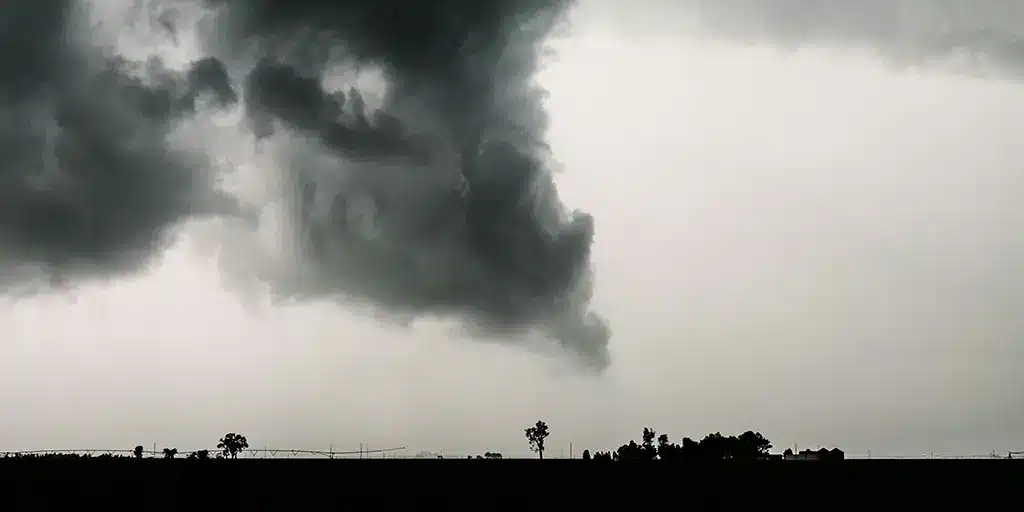Where Is God When a Disaster Happens? – Part 2

John Ankerberg and Dillon Burroughs[1]
The Persistence of Evil
Another aspect of the problem of evil is its persistence, why does God allow it? Even if He did not produce it, He does permit it. Yet He is also supposed to be all-powerful and could destroy it, so why doesn’t He?
According to philosopher-theologian Dr. Norman Geisler, the classical way to state the problem of the persistence of evil is as follows:
1. If God is all good, He would destroy evil;
2. If God is all powerful, He could destroy evil;
3. But evil is not destroyed;
4. Therefore, there is no such God.
Put this way, the argument leaves open the possibility of God, but not God as defined in the Bible. Every finite or limited being has a cause. So a finite god is only a creature that needs an infinite Creator. (In other words, a god who is not all-powerful requires an infinite, all-powerful God to create it.) And since God is powerful, then He must be infinitely powerful. Likewise, since He is good, He must be infinitely good.
“The fact of suffering undoubtedly constitutes the single greatest challenge to the Christian faith…. Sensitive spirits ask if it can possibly be reconciled with God’s justice and love.” — John Stott[2]
So, a finite god is not an option for a person who believes in the existence of God. God has both the desire and ability needed to do anything possible. But He is not going to destroy our freedom to deal with evil. He will ultimately defeat it.
The proper perspective we must have on this issue is one that separates evil in our world today from how God will ultimately deal with evil in the future. The outline of this view is:
1. God is all good and desires to defeat evil;
2. God is all powerful and is able to defeat evil;
3. Evil is not yet defeated;
4. Therefore, it will one day be defeated.
Notice, the atheist says, “Evil is not defeated, and never will be. Therefore, there is no God.” But how could anyone know that evil will never be defeated unless he were God? It would be like reading one sentence randomly from a book, throwing the book away, and then saying, “This could never turn out right.”
For those who follow Christ, there is the conviction that God is not only all-powerful, but can and will eventually eliminate all suffering and evil from the world. Evil may exist today, but it will not exist forever.
The Old Testament prophet Habakkuk expressed similar thoughts long ago:
How long, O Lord, must I call for help, but you do not listen? Or cry out to you, “Violence!” but you do not save? Why do you make me look at injustice? Why do you tolerate wrong? Destruction and violence are before me; there is strife, and conflict abounds. (Habakkuk 1:2-3)
However, God’s response to Habakkuk, that he would bring future judgment on the nations invading Israel, helped him put his concerns in their proper perspective. Evil and suffering exist in this life, but will not last forever. In the end, Habakkuk could sing:
Though the fig tree does not bud and there are no grapes on the vines, though the olive crop fails and the fields produce no food, though there are no sheep in the pen and no cattle in the stalls, yet I will rejoice in the Lord, I will be joyful in God my Savior. (Habakkuk 3:17-18)
According to Habakkuk, there was ultimately no inconsistency between the existence of evil and a loving God, as God will someday defeat all evil and straighten out all injustices.
In Psalm 96:13, the songwriter also penned, “They will sing before the Lord, for he comes, he comes to judge the earth. He will judge the world in righteousness and the peoples in his truth.” Here, the Bible rejoices also in the promise that God will at last end all evil and suffering through His perfect final judgment.
Evil and Suffering Strengthen the Fact that God Exists
Did you realize that the existence of evil and suffering can actually help show that God does exist? If we say evil does not exist, then we are assuming there is no absolute standard of good. If there were no absolute standard of good, we could not claim to know anything was evil. In order for an absolute good to exist, God is necessary.
We must have someone who draws a straight line that will serve as the standard for declaring another line crooked. Only an absolutely righteous Being can draw a line of absolute good. There cannot be an ultimate moral standard of good without an ultimate Lawgiver, and that lawgiver is God.
Charlie Campbell shares the following five-step reasoning:
1. Evil exists in the world.
2. Evil is a departure from the way things should be.
3. If there is a way things should be, there must be a standard or design to the universe.
4. There cannot be a design without a designer of the universe.
5. Evil is ultimately humanity’s departure from the standard and design provided by the intelligent designer, God.
Here’s how it might go in a conversation:
“So, we can agree that evil does exist in the world?”
“Yes,”
“Would you agree that evil is a departure from the way things ought to be?”
“Hmmm. I’m not sure ….”
“You yourself have looked at the world and have seen the famines and the diseases, and the wars, and have thought this is not the way things ought to be. They should be better. So then, evil is simply a departure (or deviation) from the way things ought to be. Can we agree with that?”
“Yes.”
“If there is a way things ought to be, there must be a designed plan (or designed standard) for the universe. So it would logically follow, and correct me if I’m wrong, that there cannot be a way that the universe ought to be (a designed plan for the universe) without a designer of the universe.
“Why’s that?” or “I disagree.”
“But you cannot have a plan, or a way the universe ought to be if the universe is just the result of some random explosion, or accident. If the universe came into existence from nothing and by nothing (which seems foolish, but that is what atheists believe) then there cannot exist a way things are supposed to be. The universe should experience suffering, diseases, death, and we could never say that anything is wrong about those things.[3]
The End of Evil
If the Bible merely confirmed that evil and suffering existed without offering an alternative or some kind of solution, we would still be left without hope. However, God has communicated that there is a point at which evil will ultimately be defeated. Those who trust in Jesus Christ will spend eternity with God in an environment without evil:
He will wipe every tear from their eyes. There will be no more death or mourning or crying or pain, for the old order of things has passed away.
He who was seated on the throne said, “I am making everything new!” Then he said, “Write this down, for these words are trustworthy and true.” (Revelation 21:4-5)
It is inaccurate to claim that evil has always existed and will always exist. According to God’s Word, evil began when God’s created beings chose to disobey His plan. Even so, God has a plan for the complete removal of evil as part of His ultimate redemption of His people.
“The question should not be, ‘Will God stop evil?,’ but ‘When will He stop evil?’” —Ken Boa and Larry Moody, I’m Glad You Asked[4]
(to be continued)
Go Deeper
- Exploring the Hope of Jesus in the Book of Revelation Collection
- Inspiring Faith in Your Children and Grandchildren – Package Offer
- Women of Faith Book Collection
- This article series includes excerpts from our book, “Why Does God Allow Evil and Suffering?” (Available as an ebook in our online store at jashow.org). ↑
- John Stott, The Cross of Christ (Downers Grove, IL: InterVarsity Press, 1986), p. 311. ↑
- Charlie Campbell, “If God, Why Evil and Suffering?” AlwaysBeReady.com. Accessed at http://alwaysbeready.com. ↑
- Ken Boa and Larry Moody, I’m Glad You Asked (Colorado Springs, CO: Victor, 1982, 1994), p. 136. ↑




